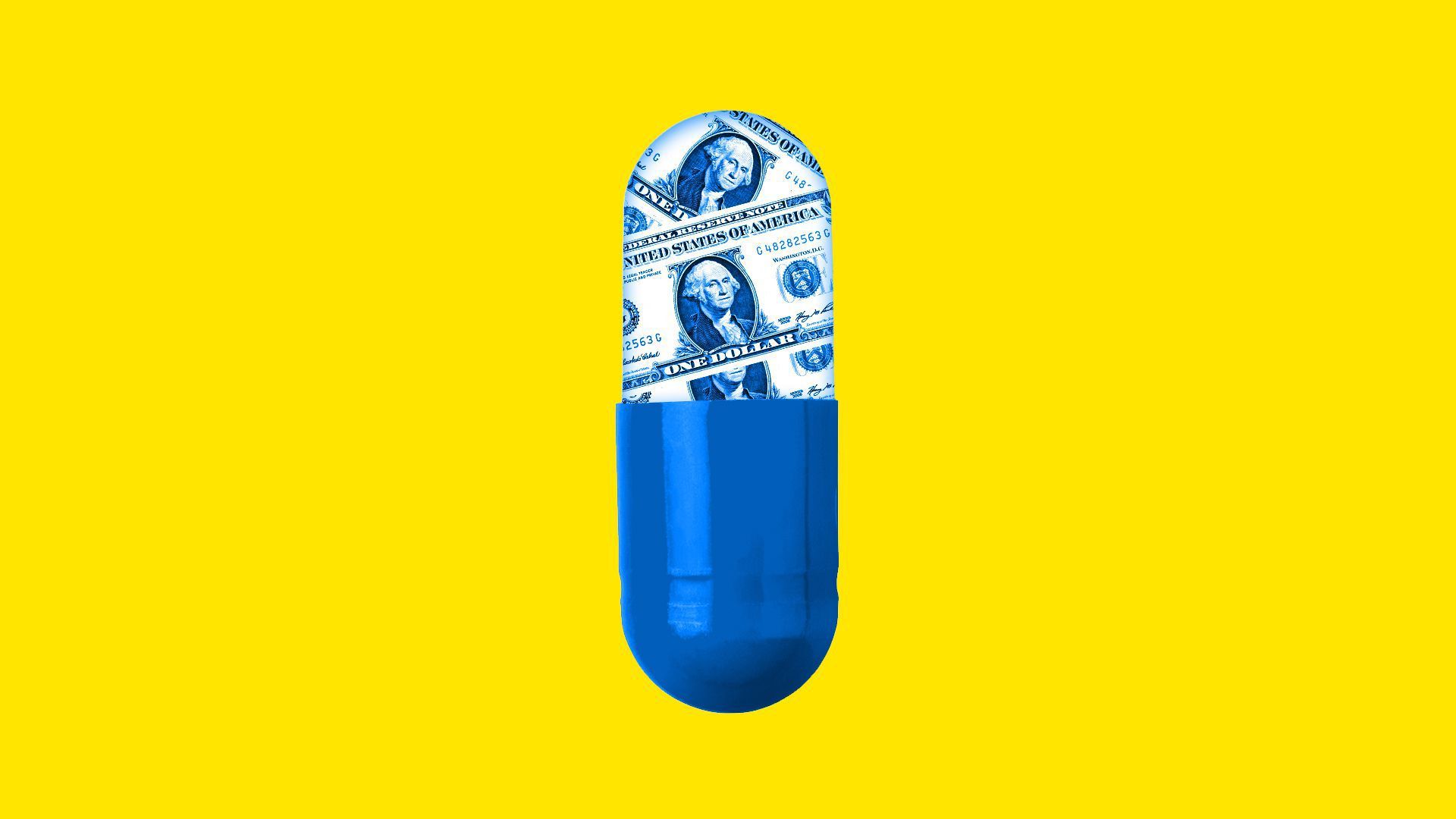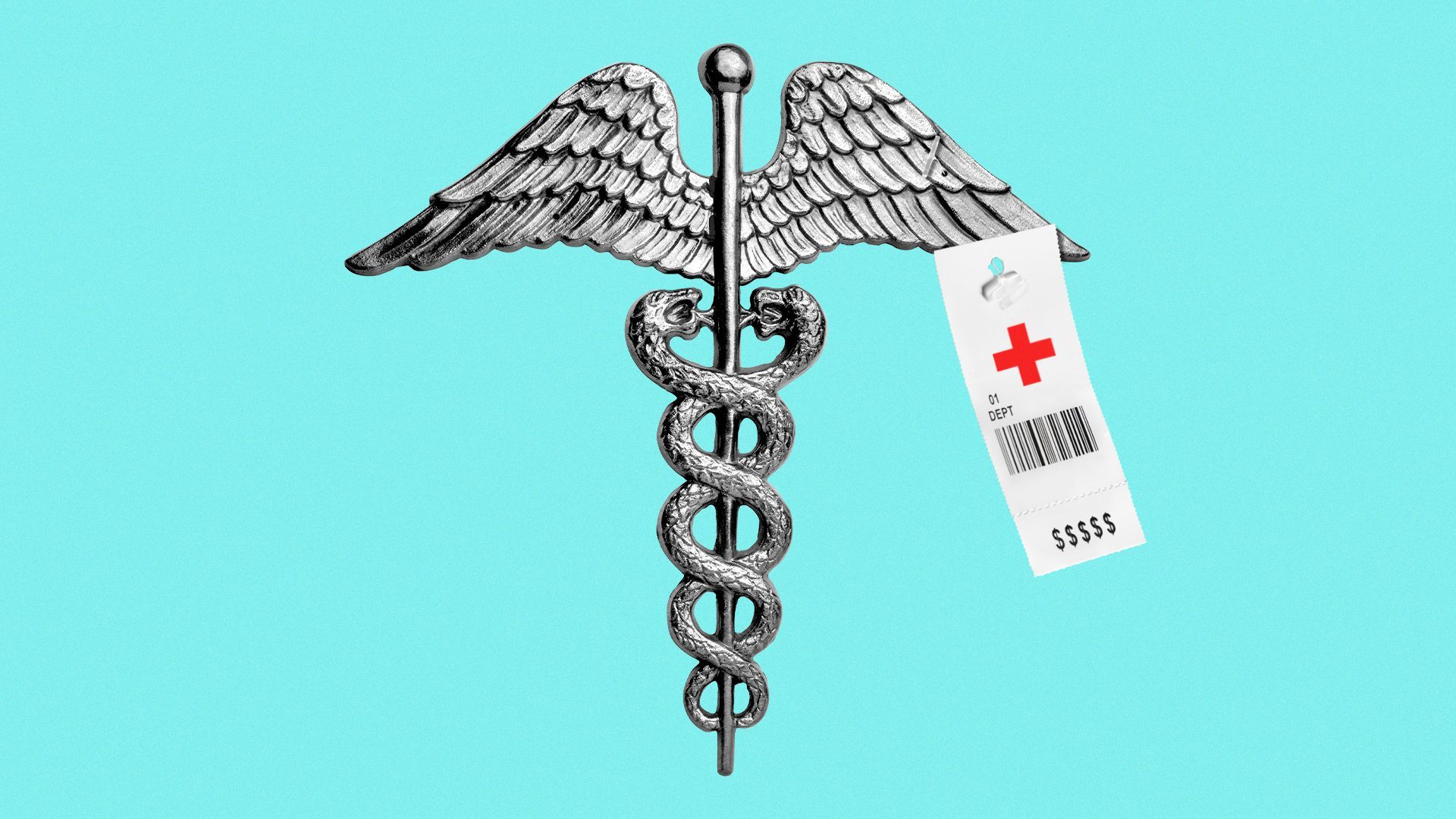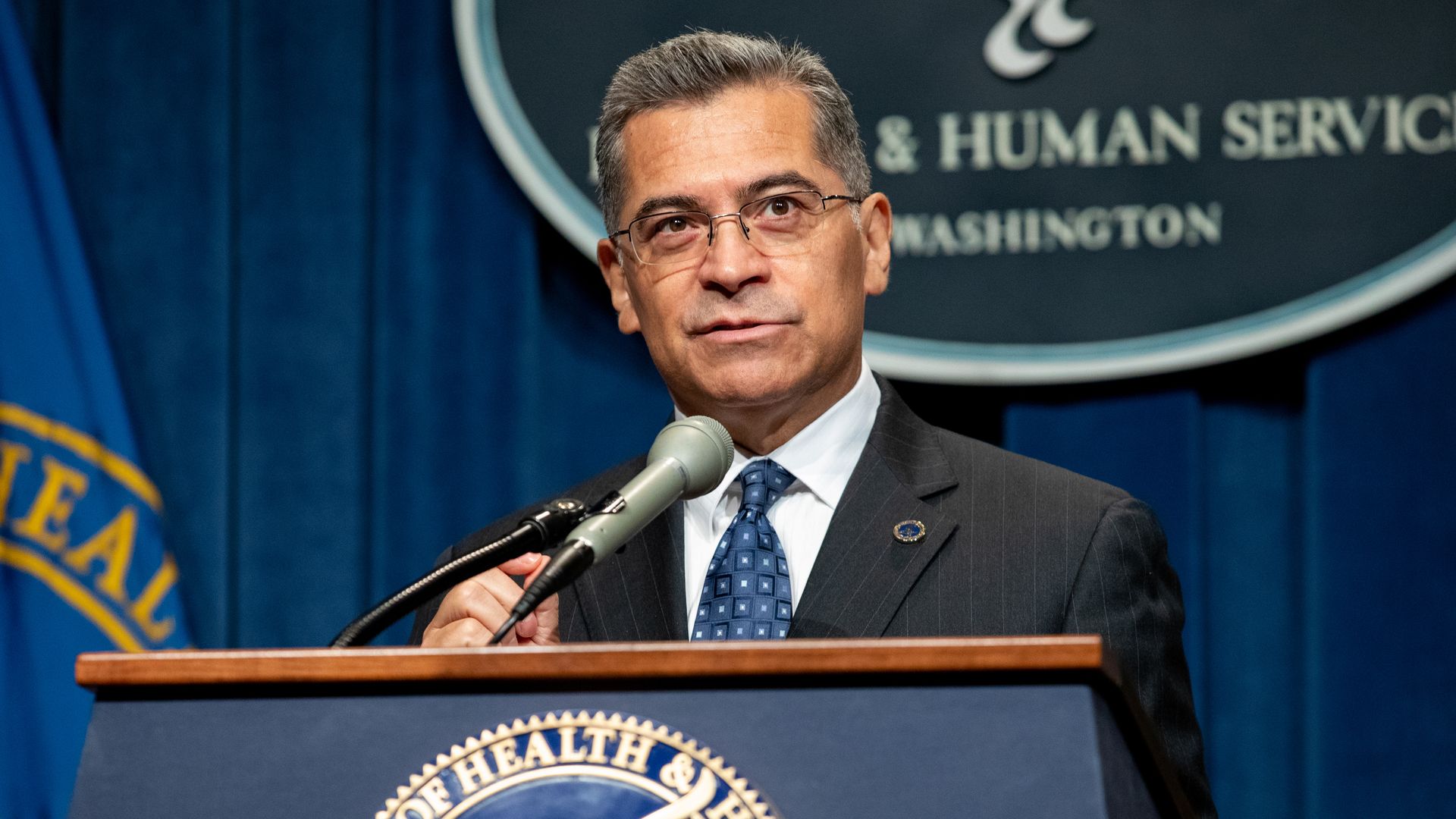Plus, Becerra blame game | Monday, August 15, 2022
| | | | | | | | | | | Axios Vitals | | By Tina Reed · Aug 15, 2022 | | Welcome back from the weekend, Vitals readers. 🤫 Situational awareness: It's looking a bit ... dare we say it? ... quiet this week. It's almost like we've finally reached the doldrums of August. - One thing to watch: The trial over the Justice Department effort to thwart UnitedHealth's $13 billion acquisition of Change Healthcare is expected to wrap this week.
Today's newsletter is 940 words or a 4-minute read. | | | | | | 1 big thing: The coming public-private drug pricing divide |  | | | Illustration: Rebecca Zisser/Axios | | | | Democrats are on the cusp of their most significant health policy victory since the passage of the Affordable Care Act. - But the legislative wrangling it took to get here came at a steep cost: the prescription drug pricing reforms included in the health, tax and climate package are limited to Medicare and exclude the millions of Americans with private insurance, Axios' Caitlin Owens writes.
Why it matters: At best, this sets up a two-tiered pricing system for certain drugs, in which employers and enrollees in the commercial market will pay a significantly higher rate than the government in the years to come. - At worst, some employers and experts warn it could cause drug prices to actually rise in the private market.
State of play: House Democrats cleared the legislation on Friday, sending it to President Biden's desk. - Once signed, the law will fulfill Democrats' decades-long promise to allow Medicare to negotiate prescription drug prices.
- It also penalizes drug companies that raise prices faster than inflation, forcing them to pay a rebate on their Medicare sales, and limits seniors' out-of-pocket costs for insulin to $35 a month.
Flashback: But excluding the commercial market from the law's reach was dictated by political necessity and arcane Senate rules. The big picture: Arguments over cost-shifting and a two-tiered pricing system aren't new to American health care — they've been the status quo within hospital markets for years. - Employers and private insurers pay multiple times the Medicare rate for hospital services, and hospitals have long argued that those higher commercial rates are necessary to offset too-low government rates.
- That private-public split is now likely to become the norm for many drugs, too, although it's still unclear how wide it will be.
Go deeper. |     | | | | | | 2. Few cancer centers have price transparency |  | | | Illustration: Natalie Peeples/Axios | | | | Less than a third of the 63 National Cancer Institute-designated cancer centers in the U.S. are fully complying with federal price transparency rules, according to an analysis in JAMA Surgery. Why it matters: Cancer treatment can be particularly costly, leading some patients to face crippling debt and even bankruptcy in their bid to find a cure. The details: A federal rule that took effect Jan. 1, 2021 required hospitals to disclose five types of standard charges for all services in an accessible file, and have a consumer-friendly display for at least 300 shoppable services. - By August 2021, 42 of the 63 cancer hospitals (about two-thirds) provided some information on negotiated rates, the analysis found.
- Only 20 of the 63 hospitals were fully compliant.
What they're saying: "What is less easy to convey in a quantitative fashion is how cumbersome most websites or files were to navigate," the authors from the University of California, Los Angeles' medical school wrote. Be smart: This analysis was conducted not long after the law went into effect. The authors acknowledge compliance will likely improve over time. |     | | | | | | 3. Traumatic injuries as chronic conditions | | It's time for the U.S. health care system to start treating traumatic injuries as chronic conditions, according to a perspective published in the New England Journal of Medicine. Why it matters: Those who suffer from traumatic injuries often suffer for years, or even their lifetime, a costly burden to their quality of life as well as the overall health care system, argue Harvard Medical School researchers. - Fatal and nonfatal injuries cost the U.S. $4.2 trillion in 2019, including $327 billion in medical care, $69 billion in lost work, and $3.8 trillion in value-of-statistical-life and quality-of-life losses, they write.
What they're saying: "People who survive such injuries have increased rates of post-traumatic stress disorder, chronic pain and functional limitations; poor health-related quality of life and social functioning years after injury; and a delayed return to work and increased risk of developing other medical conditions," they write. The big idea: The Centers for Medicare and Medicaid Services could add traumatic injuries to its list of chronic conditions. - That would permit CMS to consider new reimbursement models and incentivize health systems to implement coordinated care models to address the long-term needs of injured people, they write.
|     | | | | | | A message from Axios | | Get $200 off Axios Pro: Health Tech Deals | | |  | | | | If you've been curious about Axios Pro, there's never been a better time to subscribe. Why it matters: Inflation, international conflicts and a looming recession all make H2 difficult to forecast. Axios Pro is here to help. Use code PRO200 at checkout to get $200 off your subscription | | | | | | 4. Becerra comes under fire for monkeypox response |  | | | Photo: Amanda Andrade-Rhoades/Bloomberg via Getty Images | | | | There are growing concerns about HHS Secretary Xavier Becerra's ability to lead the response to monkeypox, Politico reported. Why it matters: It comes at a time the administration is juggling the outbreak with an uptick in polio cases, as well as the ongoing response to the COVID pandemic. - The administration is also working to rebuild confidence in its ability to respond to public health threats after critiques over shortfalls in federal agencies' handling of COVID.
Between the lines: The criticism follows news earlier this month that HHS was slow to ask that bulk stocks of the monkeypox vaccine it already owned be bottled for distribution which put the U.S. behind other clients and resulted in months-long delays, the New York Times reported. Driving the news: Eight current and former Biden administration officials confirmed internal frustrations, saying Becerra was passing the buck to the states, per the report in Politico. - An HHS spokesperson called that idea "made up," Politico reported.
|     | | | | | | 5. While you were weekending |  | | | Illustration: Aïda Amer/Axios | | | | 🗣 The WHO has started the process of renaming monkeypox, starting with how scientists refer to the variants of the virus. (The Hill) 🪧 More than 2,000 mental health workers at Kaiser Permanente locations in northern California plan to begin a strike on Monday over staffing levels and patient access concerns. (Modern Healthcare) 💰 Pharma investors have been shedding stock in anticipation of potential U.S. litigation charges later this month over the heartburn drug Zantac. (CNBC) 👉 Some non-profit community health centers have been raking in big margins over the last few years, raising questions about government oversight. (KHN) |     | | | | | | A message from Axios | | Get $200 off Axios Pro: Health Tech Deals | | |  | | | | If you've been curious about Axios Pro, there's never been a better time to subscribe. Why it matters: Inflation, international conflicts and a looming recession all make H2 difficult to forecast. Axios Pro is here to help. Use code PRO200 at checkout to get $200 off your subscription | | |  | | Why stop here? Let's go Pro. | | | | | | Axios thanks our partners for supporting our newsletters. If you're interested in advertising, learn more here.
Sponsorship has no influence on editorial content. Axios, 3100 Clarendon Blvd, Arlington VA 22201 | | | You received this email because you signed up for newsletters from Axios.
Change your preferences or unsubscribe here. | | | Was this email forwarded to you?
Sign up now to get Axios in your inbox. | | | | Follow Axios on social media:    | | | | | |








No comments:
Post a Comment